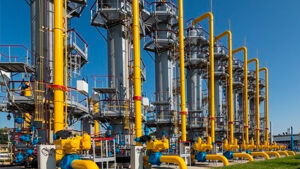
German industry may not fully recover to levels seen before the energy crisis due to high prices for imported liquefied natural gas (LNG), according to Markus Krebber, chief executive of German energy company RWE.
“Gas prices in continental Europe, and especially in Germany, are structurally higher now because we are ultimately dependent on LNG imports,” he told the Financial Times. – German industry is at a disadvantage.”
Gas prices in Europe have fallen about 90 percent from peak levels seen in 2022, but remain about two-thirds higher than in 2019, the FT wrote, citing data from Argus.
Krebber criticized Angela Merkel’s government’s decision in 2011 to abandon nuclear power without finding an alternative to Russian gas.
“When you know exactly what you want to give up, you should immediately start thinking about introducing new technologies,” he said.
Analysts are pessimistic about the prospects for Germany’s economy, Europe’s largest. According to the assessment of the five leading research institutes of Germany, the country’s GDP in 2024 will grow by only 0.1% due to the decline in exports and weak domestic demand. In 2023, the German economy contracted by 0.3%.
According to S&P Global Commodity Insights, demand for natural gas in the industrial sector in Europe fell by 24% in 2023 compared to 2019. The company’s experts believe that about 6-10% of European demand will be lost irretrievably due to demand destruction.
At the same time, the U.S. has a consistent and comprehensive policy to encourage the return of production capacity to the country, Krebber said. “Europe has the same intentions, but so far there are no proper measures in place,” he added.
A survey by the German Chamber of Commerce and Industry last September showed that 43% of large industrial companies plan to move their business outside Germany, with the US a priority. Last year, German companies announced investments of $15.7 billion in projects in the U.S., compared with $8.2 billion a year earlier, according to fDi Markets.

Naftogaz of Ukraine is negotiating gas storage deals with Germany’s RWE, Norway’s Equinor, France’s TotalEnergies and Engie, the group’s CEO Oleksiy Chernyshov told Bloomberg.
According to him, there is still time to conclude agreements, as the largest volumes of gas injection usually occur in August and September.
Chernyshov also clarified that so far no foreign company that already stores gas in Ukraine has abandoned its decisions, despite the recent Russian attacks on gas infrastructure.
The company continues to serve customers and repair equipment damaged by recent rocket attacks.
The Head of the NJSC reminded that the state energy regulator has recently improved the conditions for gas storage from June 1, 2024. The new rules include shorter booking intervals for capacity – for months rather than for a whole year, which improves the attractiveness of Ukrainian storage facilities for foreign traders.
As reported, in 2023, the volume of gas from foreign traders and energy companies pumped into Ukrainian UGS facilities for storage reached 2.5 bcm. This year, Naftogaz expects to increase this figure to 4 bcm.